Kremlin media’s weak online response to Navalny’s return to Russia
Kremlin-controlled media struggles to garner significant
Kremlin media’s weak online response to Navalny’s return to Russia
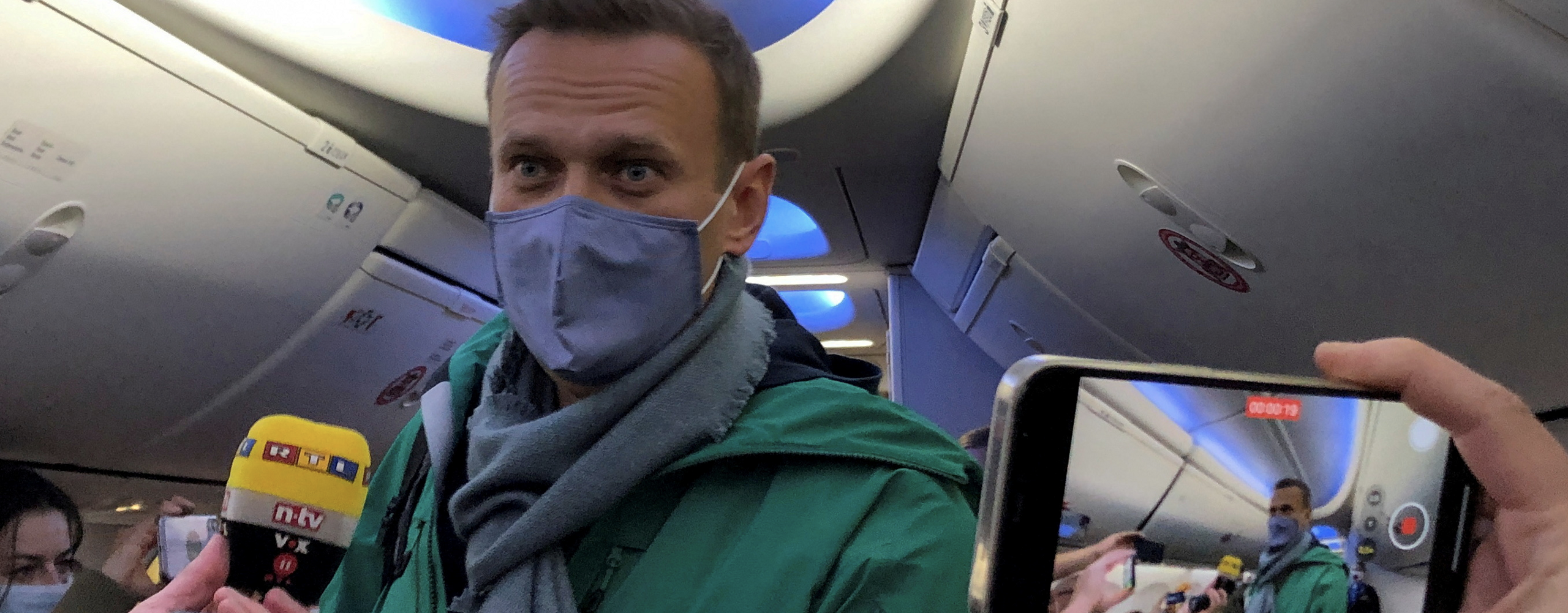
Kremlin-controlled media struggles to garner significant digital engagement for its anti-Navalny coverage
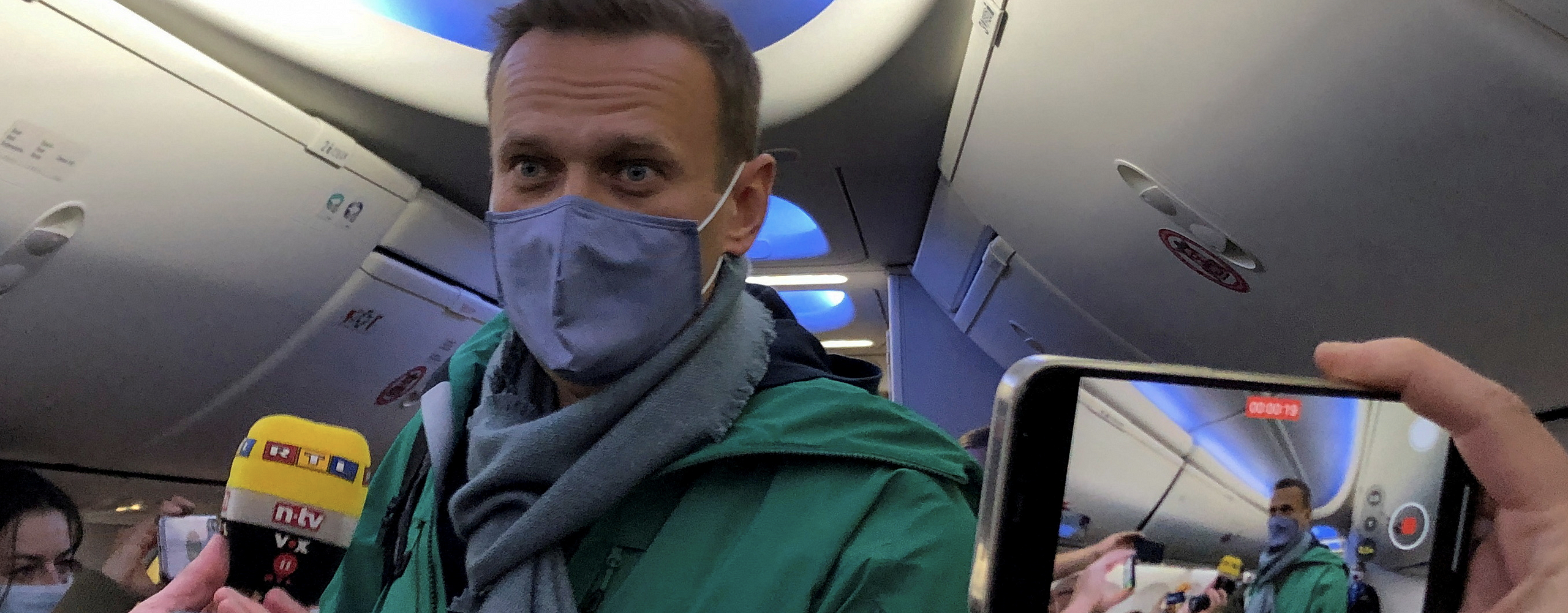
Kremlin-controlled media failed to gain significant traction in its digital smear campaign against Alexey Navalny, a leading Kremlin opponent known for his investigations of corruption schemes of Russian political and business elite, who recently provided evidence that Vladimir Putin himself ordered his poisoning in August 2020.
The lack of strong smear campaign against Navalny and appearance of a new fringe narrative that his wife Julia will take his place may show that Kremlin is still in search of new communication strategies. The previous strategies of ignoring Navalny as insignificant blogger, and a paradoxical attempt at calling him a secret Kremlin agent, appear to be ineffective.
Navalny returned to Russia on January 17, 2021 and was arrested upon arrival. He came back from Germany, where he recovered after the unsuccessful attempt to poison him with a substance from the Novichok nerve agent group while he was in Tomsk, Siberia on August 20, 2020. On December 14, 2020, the Bellingcat investigation team identified Russian Federal Security Service (FSB) agents who attempted the poisoning. On December 21, 2020, Navalny called one of his alleged killers and managed to record his confession. A week later, on December 29, 2020, Russian state prosecutors initiated a criminal charge against Navalny for spending donations raised for his nonprofit activities for personal needs. Nevertheless, the stated reason for his detention at the airport was breaching probation terms of his previous charges in 2014, which the European Court of Human Rights ruled as “arbitrary and unfair.”
On January 19, 2021, Navalny’s team published a documentary exposing a corruption scheme to build Vladimir Putin’s palace by the Black Sea. In the first three days the documentary garnered about 54 million views on YouTube. The documentary also invited people to go on streets on January 23, 2021.
Despite these bold moves by Navalny aimed at challenging the Kremlin, they did not provoke as bold response by Kremlin-controlled media.
Narratives for international audience
Following Navalny’s August 2020 poisoning, Kremlin-controlled media did not launch a large-scale information campaign against Navalny, as it did in the case of the poisoning of Segei Skripal, a former Russian intelligence officer, and his daughter Julia Skripal in March 2018. In the Skripal case, Kremlin-controlled media came up with at least five different conspiratorial theories regarding who actually poisoned the former double agent and his daughter.
After Navalny’s poisoning, the English version of RT denied he had been poisoned, based on initial test results by Russian doctors in Omsk, where Navalny received first aid, and explained why the Kremlin would not benefit from Navalny’s murder attempt. Later, RT cited two scientists who participated in Novichok’s development, saying that Novichok’s “symptoms are absolutely not similar” to what Navalny had experienced.
In terms of casting blame, the initial Kremlin narrative involved the CIA and “Western intelligence.” Another version was reportedly Putin’s allegation that “Navalny poisoned himself” or “simulated the poisoning,” but Kremlin spokesperson Dmitry Peskov denied RT that Putin told anything of the sort to French president Emanuel Macron during their bilateral call.
On January 17, 2021, when Navalny was returning home to Russia, RT produced seven news stories about Navalny’s flight. The stories were neutral in tone but did not acknowledge the facts of his poisoning.
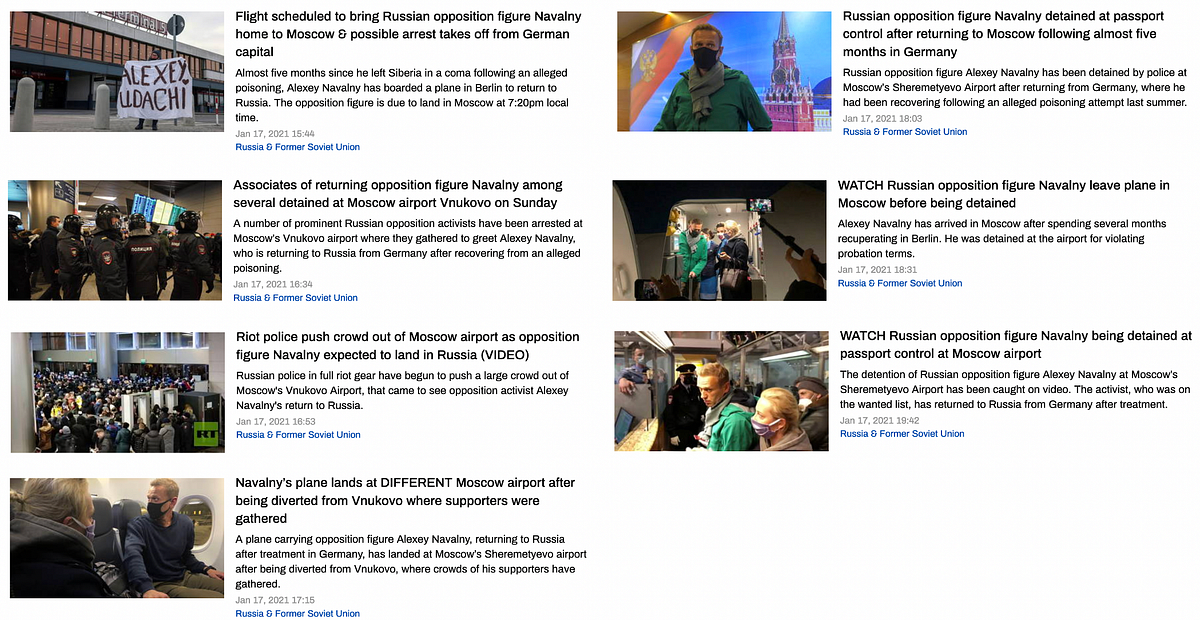
The responses to Navalny’s return by Kremlin officials, as well as politician Gennady Zyuganov, mostly blamed the West in paying too much attention to his case. Data retrieved from CrowdTangle, the social media listening tool, show that none of the stories garnered significant engagement.
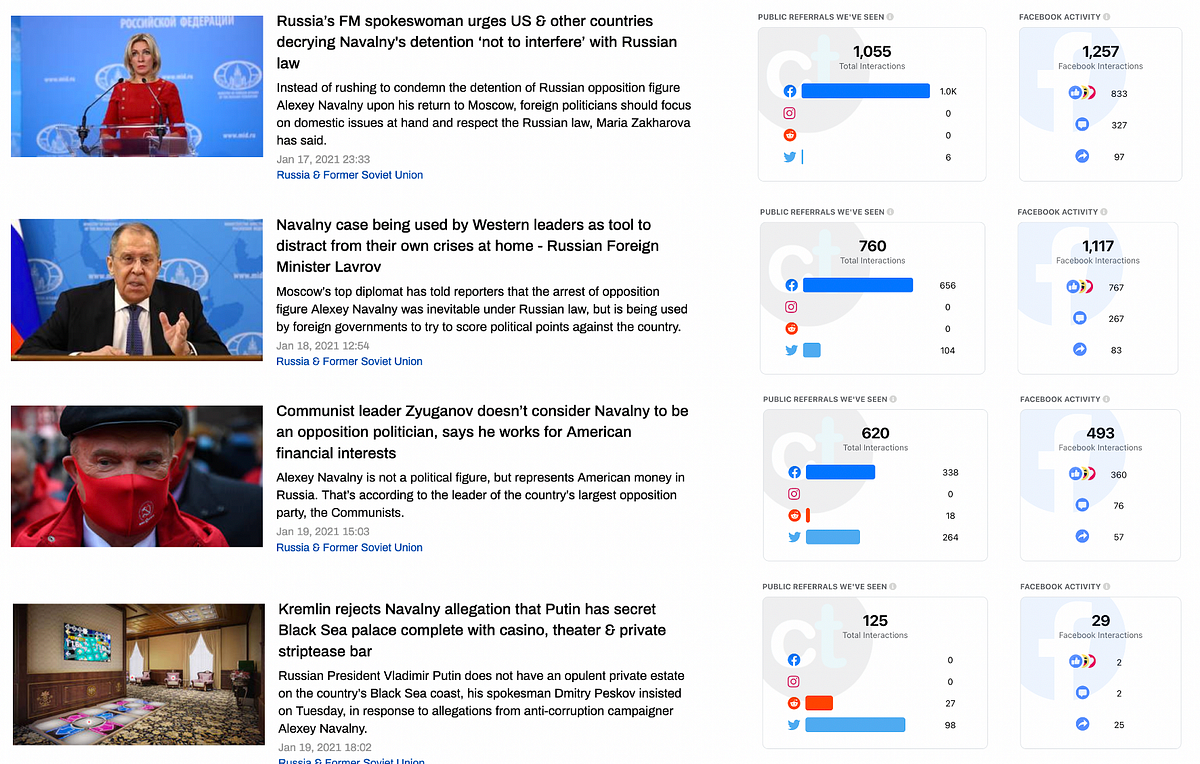
The English version of Sputnik also covered Navalny’s return and accused the West of interfering in Russia’s internal affairs. Sputnik’s stories garnered even less engagement on social media, according to CrowdTangle.
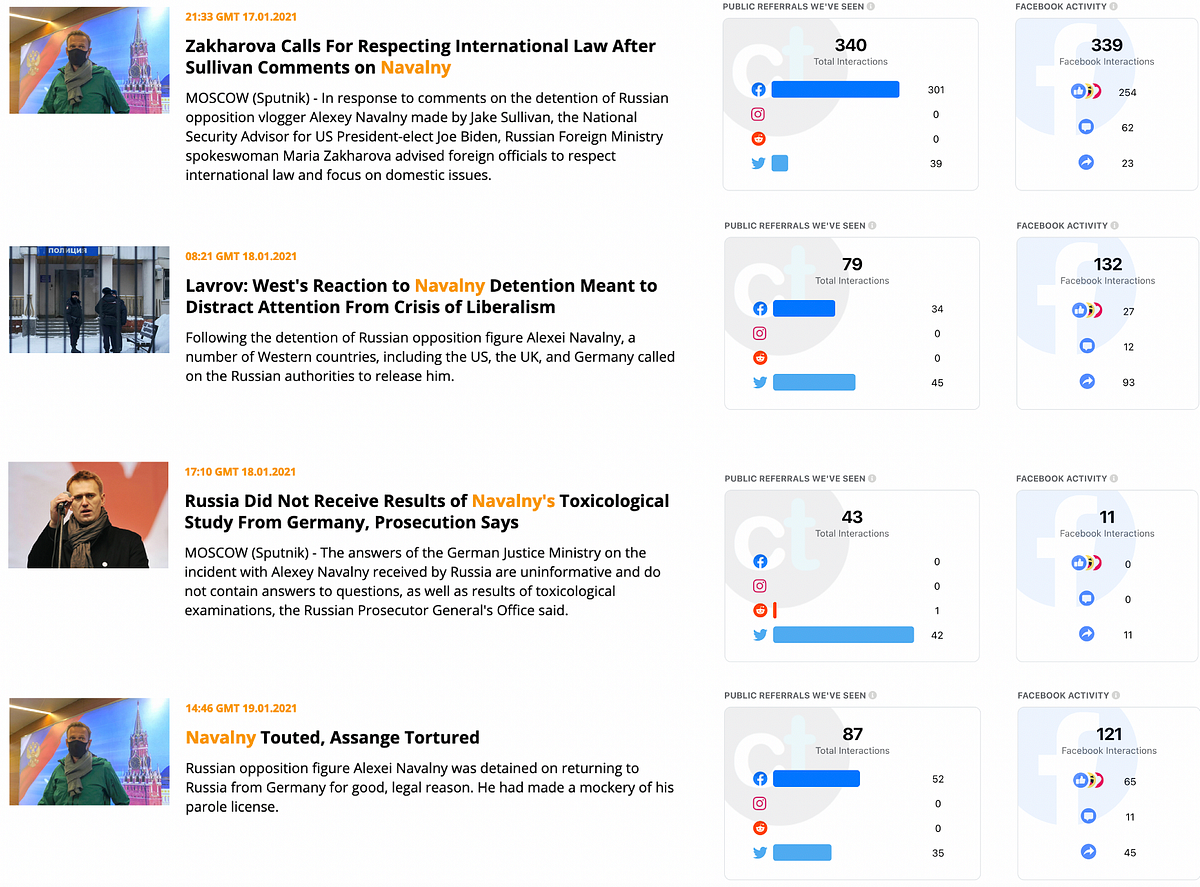
Navalny and the Kremlin
Navalny has been active in Russian politics since 2000, when he joined Yabloko, a liberal and social-democratic party. He left the party in 2007, because he did not agree with its leadership. His first meaningful attack on Russia’s ruling party Yedinaya Rossiya (United Russia) occurred in 2011, when he called it “the party of crooks and thieves” during a radio interview before Russian Parliamentary elections in 2011, reportedly leading to search engines results displaying “Yedinaya Rossiya — the party of crooks and thieves” as a result of his online mock campaign. Yedinaya Rossiya rigged the elections in their favor, according to the European Court of Human Rights, and it sparked the “biggest protests since fall of USSR,” according to BBC.
Later, in 2013, Kremlin leadership reportedly decided to allow Navalny to participate in Moscow’s mayoral elections. According to an investigation by independent Russian media outlet Proekt, the plan was to “let Navalny run for the elections, he will get low result, and everyone will see that he has no political potential.” In reality, Navalny came in second, garnering more than 27 percent of votes, and the plan failed.
Later, in 2018, Navalny attempted to run for President, but it was prevented due to previous legal charges for suggesting a Russian company was selling wood below market price.
Narratives for domestic audiences
Proekt’s investigation suggests that there are enough legal excuses for Russian law enforcement to put Navalny in jail, but until now, the Kremlin decided to use other methods to avoid Navalny’s supporters from protesting. For instance, according to Proekt, the Kremlin invented a rumor that Navalny was still free and alive because he is actually an agent of the Kremlin.
In April 2017, activists from South East Radical Block (SERB), a separatist movement from Eastern Ukraine, attacked Navalny by spilling a green substance in Navalny’s face. He lost sight in his right eye and he asked the Kremlin permission to go abroad to receive treatment in Spain despite being under house arrest. According to Russian law, his request should have been rejected, but the Kremlin issued him passport to travel aboard. Thus, SERB “confirmed” rumors that he was “the Kremlin’s agent.”
Another narrative claimed Navalny is receiving money from oligarchs and the United States. The narrative was presented in a 2017 documentary called “Lyberalam — Chrernym Nalom” (“Dark Cash for Liberals”) on REN TV, a Russian TV channel notorious for spreading conspiracies and scientific disinformation. The documentary contained footage from CCTV cameras and hidden cameras. Proekt’s investigation suggests that the documentary was produced upon FSB’s request using material gathered by FSB surveillance.
The current response by Kremlin-controlled media outlets is consistent with previous Navalny narratives, and apparently is testing a new one about his wife Julia. On January 17, 2021, during the weekend news program on Russian state-owned TV channel Rossiya 1, Dmitry Kiselyov, the EU-sanctioned TV host and “Russia’s chief spin doctor,” put an emphasis on the way German authorities escorted Navalny to the airport, suggesting that it was an exaggerated PR campaign.
The following day, state-owned TV channel Rossiya 24 aired an elaborate story on Navalny’s supposed wrongdoings. First, it explained the newest charges against Navalny about allegedly spending donations to his NGO for personal needs. It then listed cases when Navalny met with U.S. State Department officials and other diplomats from Western countries, and cited connections with individuals and organizations who support pro-Western movements in Ukraine and elsewhere.
The conclusion of the story included tweets by French members of the European Parliament who are connected with Marie Le Pen, a popular far-right politician in France who is friendly with Putin. The tweets were cited to argue that Western countries have double standards. They were also used to create news stories for Russian-language RT.
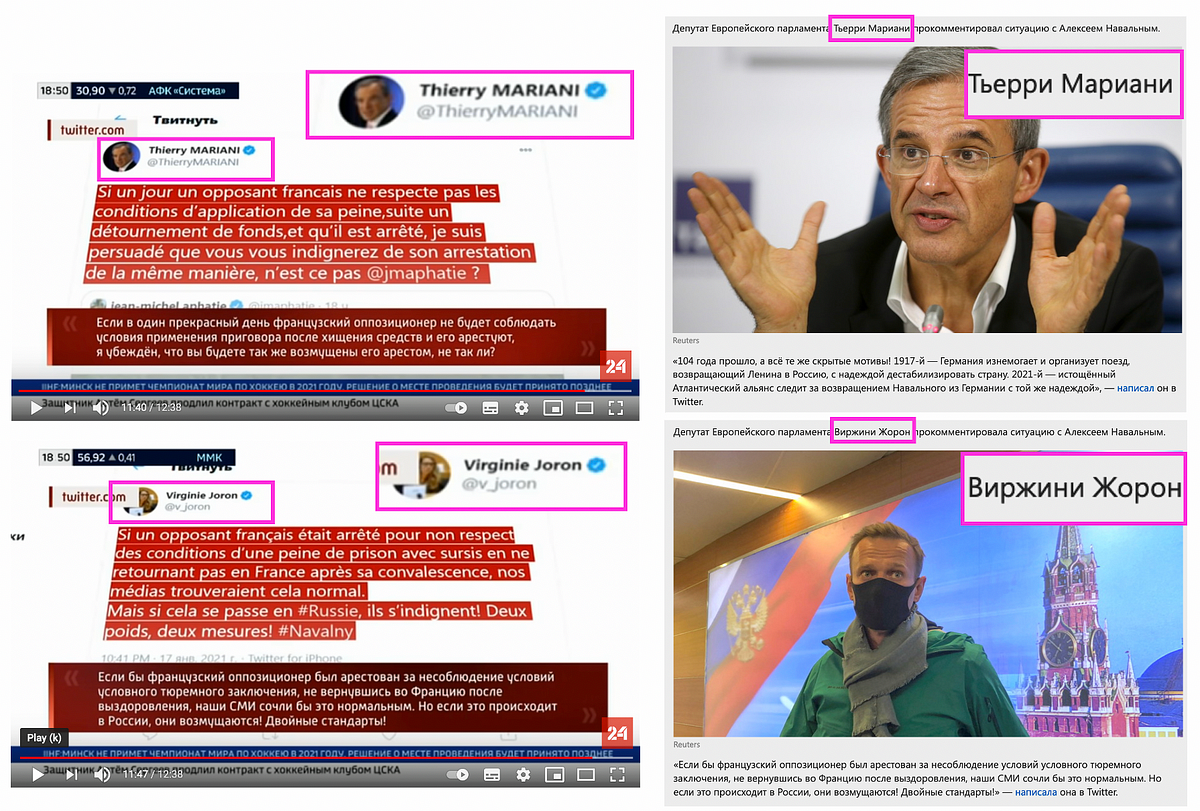
The Rossiya 24 story garnered 721,497 views in four days, significantly less than Navalny’s story about Putin’s palace — 54 million views in three days.
Another smear story about Navalny by Tsargrad, a conservative pro-Kremlin media outlet, garnered just 52,297 views in a week.
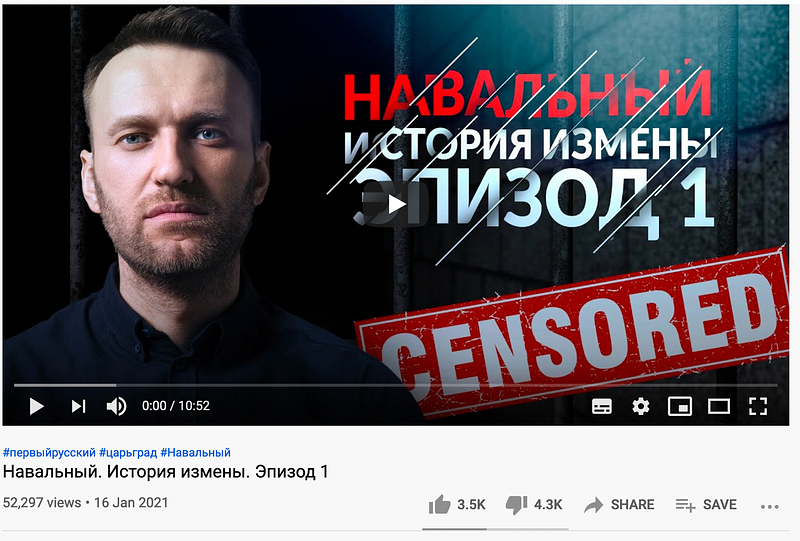
The story went live a day before Navalny returned to Russia and promised to continue investigating him. Tsargrad called Navalny a Russophobe and suggested that his wife Julia will take his place among the Russian opposition, as Sviatlana Tikhanouskaya was substituted after her husband Sergey Tsikhanousky was arrested prior to the Belarus presidential elections. The story suggested that Julia Navalny is the next “Western project.”
Nika Aleksejeva is a Digital Forensic Research Associate with the Digital Forensic Research Lab.
Follow along for more in-depth analysis from our #DigitalSherlocks.

